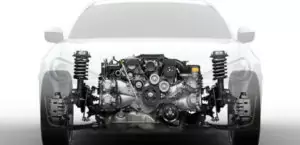The 1.4-liter Volkswagen BKG 1.4 FSI engine was produced by the concern from 2003 to 2006 and was installed only on some modifications of the fifth generation of the popular Golf model. The power units of this series relatively quickly gave way to turbocharged engines.
The EA111-FSI series includes: ARR, BKG, BAD, BAG, BLF.
Specifications
| Production years | 2003-2006 |
| Displacement, cc | 1390 |
| Fuel system | direct injection |
| Power output, hp | 90 |
| Torque output, Nm | 130 |
| Cylinder block | aluminum R4 |
| Block head | aluminum 16v |
| Cylinder bore, mm | 76.5 |
| Piston stroke, mm | 75.6 |
| Compression ratio | 12.0 |
| Features | DOHC |
| Hydraulic lifters | yes |
| Timing drive | chain |
| Phase regulator | no |
| Turbocharging | no |
| Recommended engine oil | 5W-30 |
| Engine oil capacity, liter | 3.5 |
| Fuel type | petrol |
| Euro standards | EURO 4 |
| Fuel consumption, L/100 km (for VW Golf 2004) — city — highway — combined |
7.9 5.4 6.2 |
| Engine lifespan, km | ~250 000 |
The engine was installed on:
- Volkswagen Golf 5 (1K) in 2003 – 2006.
Disadvantages of the VW BKG engine
- The main problems are delivered by a complex intake system with many sensors.
- This system not only often fails, but also leads to difficult starting in cold weather.
- In second place is the unreliable timing chain, sometimes it stretches to 100,000 km.
- Carry spare ignition coils with you, here they constantly fail.
- More disadvantages: increased carbon formation and oil consumption at high mileage.






